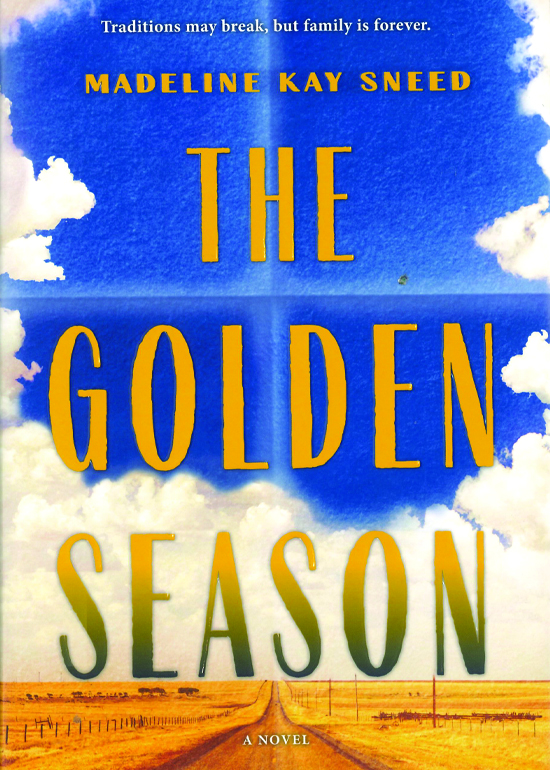West Texas, Football, and Queerness

The Golden Season
by Madeline Kay Sneed
New York: Graydon House, 2022.
352 pp. $26.99 Hardcover.
Reviewed by
Fable Jude
Madeline Kay Sneed’s debut novel, The Golden Season, brings together football, faith, and queerness. If you aren’t sure how those things go together, this book will teach you. The story follows Emmy Quinn as she navigates coming out to her parents and beginning her first romantic relationship. Sneed is self-professedly obsessed with the intersections of queerness and faith. The novel manages to evade sentimentality and clichés while delving into what it means to be queer in an environment where everyone you know thinks you’re going to hell.
The novel begins with the Flannery O’Connor quote: “I think it is safe to say that while the South is hardly Christ-centered, it is most certainly Christ-haunted,” which sets the tone for the novel. Throughout the book Emmy is haunted by the faith she held so closely during her upbringing. At the beginning Emmy comes out to her parents, Steve and Lucy (who have been divorced for several years) before returning to college for the fall. While her mother is upset and not supportive, her father is furious. The conversation ends with him stating “that road leads to hell” and his locking Emmy out of her childhood home.
The point of view then shifts to Steve and how he deals with the aftermath of this falling out. The rest of the novel alternates between Emmy and Steve’s points of view. This is an interesting narrative move because we always want to empathize with the narrator of a story. But the effect fell a little flat. Steve’s character is a stereotypical Evangelical high school football coach. The story never complicates him further despite giving him the opportunity to wrestle with complex emotions. He is given the head coaching position for the high school team but is told that he better not have any dirt to dig up. Early on, Steve visits his pastor to discuss Emmy’s “choice.” He asks, “So how do you reckon I fix her?” The pastor affirms Steve’s choice to throw her out. When the school board finds out about Emmy, Steve is warned to keep her away or he will lose his job. He holds out until after the team wins the big state game to call her. For Steve to just follow along with his pastor and the school board without question or trepidation ultimately left him feeling more like a counterpoint or plot device rather than a fleshed-out character in his own right.
Early on Emmy meets Cameron, a bold and magnetic grad student who frequents the bar where Emmy’s best friend works. At first their relationship burns bright, and they spend all their time together. As the novel progresses Cameron becomes overly possessive of Emmy and doesn’t want her around anyone else, especially a closeted lesbian professor who Emmy met when she was kicked out of her sorority. Ultimately, they both realize this relationship isn’t working, despite their intense love for each other, and they break up. The complexity that Sneed brought to this relationship is much appreciated. The deft handling of the varying relationships, romantic and otherwise, is the novel’s strength.
As the title implies, the seasons are a huge theme. The novel is broken up into four sections, one for each season. Each section begins with a description of the change in season in West Texas. The seasons and their weather are woven into some of the descriptions throughout as when Emmy thinks, “She could feel the shift in her life the way she could smell the rain in the air before a storm.” These descriptions and the themes of seasons tie into the idea of seasons of life and how emotions shift as we grow as people, which could have felt overly simplistic. Sneed creates these themes organically.
Obviously, with the setting being West Texas the religious themes are deeply ingrained, but Sneed’s take is refreshing. She doesn’t condemn religion, but she doesn’t allow it to take over the story as others do with the trope of the tolerant Christian. Toward the end of the novel, Emmy visits her old pastor, whose daughter was a childhood friend and crush of Emmy’s. This pastor tells Emmy his daughter is a lesbian, and he loves her and that’s the thing that matters. He presents a new ideology for Emmy, the idea that heaven or hell are not the end all be all of Christianity, but that at the end of the day how much love you are able to give is. This allows Emmy to have some closure about her father without the sentimental ending of him realizing his love for his daughter is stronger than his love for God and accepting her with open arms. This ending is complicated and a little messier but ultimately satisfying.
Sneed’s debut is a bright and refreshing take on the ways we learn to love, despite the fixedness of the past. I look forward to future works from this bold and brilliant rising star of Texas.
Fable Jude was born in Upstate New York, raised in West Michigan, and currently lives in Central Texas. She has a bachelor's degree in English from Grand Valley State University. She is currently a graduate student at Texas State University studying for her MFA in Fiction.
